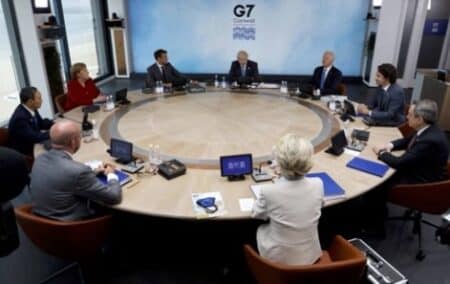In its final communiqué, the G7 raised a number of concerns about China, highlighting the growing geopolitical tensions between it and the world’s democracies.
Among the issues raised in the document are China’s conduct in respect of human rights in the Xinjiang region and the autonomy of Hong Kong.
‘We will promote our values, including by calling on China to respect human rights and fundamental freedoms, especially in relation to Xinjiang and those rights, freedoms and high degree of autonomy for Hong Kong enshrined in the Sino-British Joint Declaration and the Basic Law.’
In addition, it demanded ‘a timely, transparent, expert-led, and science-based WHO-convened‘ Phase 2 COVID-19 Origins study including research in China, as recommended by the experts. This a sensitive issue for China, as it speaks to whether the virus was perhaps ‘leaked’ from a lab, or that China may have concealed the outbreak in its initial stages.
Perhaps most importantly, the communiqué referred to tensions over Taiwan. ‘We reiterate the importance of maintaining a free and open Indo Pacific, which is inclusive and based on the rule of law. We underscore the importance of peace and stability across the Taiwan Strait, and encourage the peaceful resolution of cross-Strait issues. We remain seriously concerned about the situation in the East and South China Seas and strongly oppose any unilateral attempts to change the status quo and increase tensions.’
China claims the self-governing democracy as its own and has threatened the use of force to ‘reunify’ China and Taiwan. It is unclear how other countries, particularly the United States would act in this eventuality, but the growing wariness about China’s presence on the world has heightened concerns about Taiwan’s fate and what it may mean for the region.

